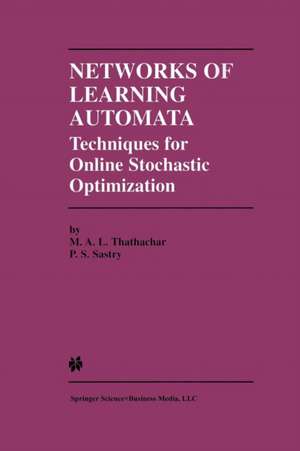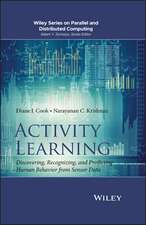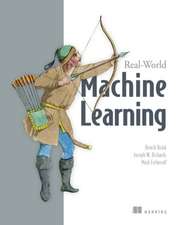Networks of Learning Automata: Techniques for Online Stochastic Optimization
Autor M.A.L. Thathachar, P.S. Sastryen Limba Engleză Paperback – 28 sep 2012
| Toate formatele și edițiile | Preț | Express |
|---|---|---|
| Paperback (1) | 640.06 lei 6-8 săpt. | |
| Springer Us – 28 sep 2012 | 640.06 lei 6-8 săpt. | |
| Hardback (1) | 647.40 lei 6-8 săpt. | |
| Springer Us – 31 oct 2003 | 647.40 lei 6-8 săpt. |
Preț: 640.06 lei
Preț vechi: 753.01 lei
-15% Nou
Puncte Express: 960
Preț estimativ în valută:
122.49€ • 127.41$ • 101.12£
122.49€ • 127.41$ • 101.12£
Carte tipărită la comandă
Livrare economică 15-29 aprilie
Preluare comenzi: 021 569.72.76
Specificații
ISBN-13: 9781461347750
ISBN-10: 1461347750
Pagini: 288
Ilustrații: XV, 268 p.
Dimensiuni: 155 x 235 x 15 mm
Greutate: 0.41 kg
Ediția:Softcover reprint of the original 1st ed. 2004
Editura: Springer Us
Colecția Springer
Locul publicării:New York, NY, United States
ISBN-10: 1461347750
Pagini: 288
Ilustrații: XV, 268 p.
Dimensiuni: 155 x 235 x 15 mm
Greutate: 0.41 kg
Ediția:Softcover reprint of the original 1st ed. 2004
Editura: Springer Us
Colecția Springer
Locul publicării:New York, NY, United States
Public țintă
ResearchCuprins
1. Introduction.- 1.1 Machine Intelligence and Learning.- 1.2 Learning Automata.- 1.3 The Finite Action Learning Automaton (FALA).- 1.4 Some Classical Learning Algorithms.- 1.5 The Discretized Probability FALA.- 1.6 The Continuous Action Learning Automaton (CALA).- 1.7 The Generalized Learning Automaton (GLA).- 1.8 The Parameterized Learning Automaton (PLA).- 1.9 Multiautomata Systems.- 1.10 Supplementary Remarks.- 2. Games of Learning Automata.- 2.1 Introduction.- 2.2 A Multiple Payoff Stochastic Game of Automata.- 2.3 Analysis of the Automata Game Algorithm.- 2.4 Game with Common Payoff.- 2.5 Games of FALA.- 2.6 Common Payoff Games of CALA.- 2.7 Applications.- 2.8 Discussion.- 2.9 Supplementary Remarks.- 3. Feedforward Networks.- 3.1 Introduction.- 3.2 Networks of FALA.- 3.3 The Learning Model.- 3.4 The Learning Algorithm.- 3.5 Analysis.- 3.6 Extensions.- 3.7 Convergence to the Global Maximum.- 3.8 Networks of GLA.- 3.9 Discussion.- 3.10 Supplementary Remarks.- 4. Learning Automata for Pattern Classification.- 4.1 Introduction.- 4.2 Pattern Recognition.- 4.3 Common Payoff Game of Automata for PR.- 4.4 Automata Network for Pattern Recognition.- 4.5 Decision Tree Classifiers.- 4.6 Discussion.- 4.7 Supplementary Remarks.- 5. Parallel Operation of Learning Automata.- 5.1 Introduction.- 5.2 Parallel Operation of FALA.- 5.3 Parallel Operation of CALA.- 5.4 Parallel Pursuit Algorithm.- 5.5 General Procedure.- 5.6 Parallel Operation of Games of FALA.- 5.7 Parallel Operation of Networks of FALA.- 5.8 Discussion.- 5.9 Supplementary Remarks.- 6. Some Recent Applications.- 6.1 Introduction.- 6.2 Supervised Learning of Perceptual Organization in Computer Vision.- 6.3 Distributed Control of Broadcast Communication Networks.- 6.4O ther Applications.- 6.5 Discussion.- Epilogue.- Appendices.- A The ODE Approach to Analysis of Learning Algorithms.- A.I Introduction.- A.2 Derivation of the ODE Approximation.- A.2.1 Assumptions.- A.2.2 Analysis.- A.3 Approximating ODEs for Some Automata Algorithms.- A.3.2 The CALA Algorithm.- A.3.3 Automata Team Algorithms.- A.4 Relaxing the Assumptions.- B Proofs of Convergence for Pursuit Algorithm.- B.1 Proof of Theorem 1.1.- B.2 Proof of Theorem 5.7.- C Weak Convergence and SDE Approximations.- C.I Introduction.- C.2 Weak Convergence.- C.3 Convergence to SDE.- C.3.1 Application to Global Algorithms.- C.4 Convergence to ODE.- References.











